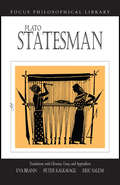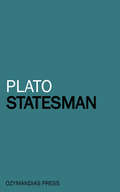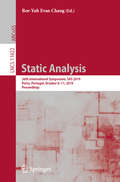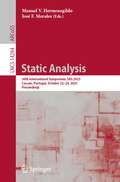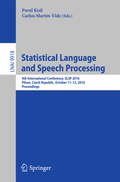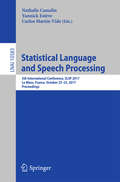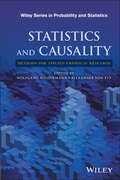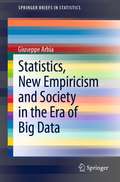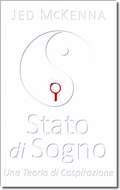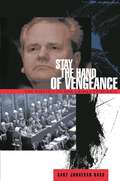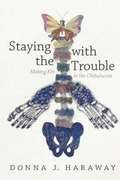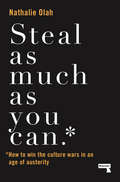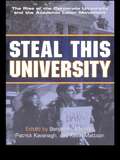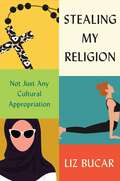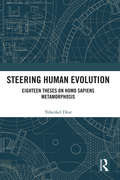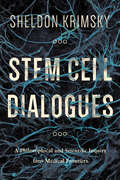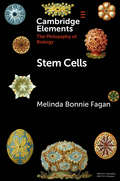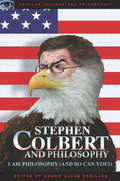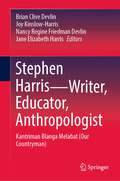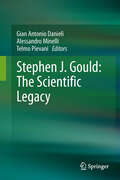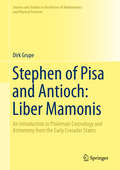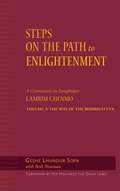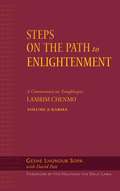- Table View
- List View
Statesman
by Plato Eva Brann Peter Kalkavage Eric SalemThis is the second of a projected trilogy of dialogues, in which an unnamed stranger sets out to satisfy Socrates' desire for an account of sophist, statesman, and philosopher. (The third was never written.) Focus Philosohpical Library’s Statesman includes a faithful, clear, and consistent translation to English, with notes. It also includes an exploratory essay, glossary of crucial Greek terms, supplemental diagrams illustrating diairesis ("The Divisions of the Statesman"), and an appendix on the paradigm of weaving.
Statesman
by PlatoThe text describes a conversation among Socrates, the mathematician Theodorus, another person named Socrates (referred to as "Young Socrates"), and an unnamed philosopher from Elea referred to as "the Stranger". It is ostensibly an attempt to arrive at a definition of "statesman," as opposed to "sophist" or "philosopher" and is presented as following the action of the Sophist.
Static Analysis: 26th International Symposium, SAS 2019, Porto, Portugal, October 8–11, 2019, Proceedings (Lecture Notes in Computer Science #11822)
by Bor-Yuh Evan ChangThis book constitutes the refereed proceedings of the 26th International Symposium on Static Analysis, SAS 2019, held in Porto, Portugal, in October 2019. The 20 regular papers presented in this book were carefully reviewed and selected from 50 submissions. The papers are grouped in topical sections on pointers and dataflow; languages and decidability; numerical; trends: assuring machine learning; synthesis and security; and temporal properties and termination.
Static Analysis: 30th International Symposium, SAS 2023, Cascais, Portugal, October 22–24, 2023, Proceedings (Lecture Notes in Computer Science #14284)
by José F. Morales Manuel V. HermenegildoThis book constitutes the refereed proceedings of the 30th International Symposium on Static Analysis, SAS 2023, held in Lisbon, Portugal, in October 2023. The 20 full papers included in this book were carefully reviewed and selected from 40 submissions. Static analysis is widely recognized as a fundamental tool for program verification, bug detection, compiler optimization, program understanding, and software maintenance. The papers deal with theoretical, practical and application advances in the area.
Statistical Language and Speech Processing: 4th International Conference, SLSP 2016, Pilsen, Czech Republic, October 11-12, 2016, Proceedings (Lecture Notes in Computer Science #9918)
by Carlos Martín-Vide Pavel KrálThis book constitutes the refereed proceedings of the 4th International Conference on Statistical Language and Speech Processing, SLSP 2016, held in Pilsen, Czech Republic, in October 2016. The 11 full papers presented together with two invited talks were carefully reviewed and selected from 38 submissions. The papers cover topics such as anaphora and coreference resolution; authorship identification, plagiarism and spam filtering; computer-aided translation; corpora and language resources; data mining and semantic web; information extraction; information retrieval; knowledge representation and ontologies; lexicons and dictionaries; machine translation; multimodal technologies; natural language understanding; neural representation of speech and language; opinion mining and sentiment analysis; parsing; part-of-speech tagging; question and answering systems; semantic role labeling; speaker identification and verification; speech and language generation; speech recognition; speech synthesis; speech transcription; speech correction; spoken dialogue systems; term extraction; text categorization; test summarization; user modeling.
Statistical Language and Speech Processing: 5th International Conference, SLSP 2017, Le Mans, France, October 23–25, 2017, Proceedings (Lecture Notes in Computer Science #10583)
by Nathalie Camelin, Yannick Estève and Carlos Martín-VideThis book constitutes the refereed proceedings of the 5th International Conference on Statistical Language and Speech Processing, SLSP 2017, held in Le Mans, France, in October 2017. The 21 full papers presented were carefully reviewed and selected from 39 submissions. The papers cover topics such as anaphora and conference resolution; authorship identification, plagiarism and spam filtering; computer-aided translation; corpora and language resources; data mining and semanticweb; information extraction; information retrieval; knowledge representation and ontologies; lexicons and dictionaries; machine translation; multimodal technologies; natural language understanding; neural representation of speech and language; opinion mining and sentiment analysis; parsing; part-of-speech tagging; question and answering systems; semantic role labeling; speaker identification and verification; speech and language generation; speech recognition; speech synthesis; speech transcription; speech correction; spoken dialogue systems; term extraction; text categorization; test summarization; user modeling. They are organized in the following sections: language and information extraction; post-processing and applications of automatic transcriptions; speech paralinguistics and synthesis; speech recognition: modeling and resources.
Statistical Models and Causal Inference
by David A. FreedmanDavid A. Freedman presents here a definitive synthesis of his approach to causal inference in the social sciences. He explores the foundations and limitations of statistical modeling, illustrating basic arguments with examples from political science, public policy, law, and epidemiology. Freedman maintains that many new technical approaches to statistical modeling constitute not progress, but regress. Instead, he advocates a 'shoe leather' methodology, which exploits natural variation to mitigate confounding and relies on intimate knowledge of the subject matter to develop meticulous research designs and eliminate rival explanations. When Freedman first enunciated this position, he was met with scepticism, in part because it was hard to believe that a mathematical statistician of his stature would favor 'low-tech' approaches. But the tide is turning. Many social scientists now agree that statistical technique cannot substitute for good research design and subject matter knowledge. This book offers an integrated presentation of Freedman's views.
Statistics and Causality: Methods for Applied Empirical Research
by Alexander Von Eye Wolfgang WiedermannA one-of-a-kind guide to identifying and dealing with modern statistical developments in causality Written by a group of well-known experts, Statistics and Causality: Methods for Applied Empirical Research focuses on the most up-to-date developments in statistical methods in respect to causality. Illustrating the properties of statistical methods to theories of causality, the book features a summary of the latest developments in methods for statistical analysis of causality hypotheses. The book is divided into five accessible and independent parts. The first part introduces the foundations of causal structures and discusses issues associated with standard mechanistic and difference-making theories of causality. The second part features novel generalizations of methods designed to make statements concerning the direction of effects. The third part illustrates advances in Granger-causality testing and related issues. The fourth part focuses on counterfactual approaches and propensity score analysis. Finally, the fifth part presents designs for causal inference with an overview of the research designs commonly used in epidemiology. Statistics and Causality: Methods for Applied Empirical Research also includes: * New statistical methodologies and approaches to causal analysis in the context of the continuing development of philosophical theories * End-of-chapter bibliographies that provide references for further discussions and additional research topics * Discussions on the use and applicability of software when appropriate Statistics and Causality: Methods for Applied Empirical Research is an ideal reference for practicing statisticians, applied mathematicians, psychologists, sociologists, logicians, medical professionals, epidemiologists, and educators who want to learn more about new methodologies in causal analysis. The book is also an excellent textbook for graduate-level courses in causality and qualitative logic. Wolfgang Wiedermann, PhD, is Assistant Professor in the Department of Educational, School, and Counseling Psychology at the University of Missouri, Columbia. His research interests include the development of methods for direction dependence analysis and causal inference, the development and evaluation of methods for person-oriented research, and methods for intensive longitudinal data. Alexander von Eye, PhD, is Professor Emeritus of Psychology at Michigan State University. His research interests include statistical methods, categorical data analysis, and human development. Dr. von Eye is Section Editor for the Encyclopedia of Statistics in Behavioral Science and is the coauthor of Log-Linear Modeling: Concepts, Interpretation, and Application, both published by Wiley.
Statistics, New Empiricism and Society in the Era of Big Data (SpringerBriefs in Statistics)
by Giuseppe ArbiaThis book reveals the myriad aspects of Big Data collection and analysis, by defining and clarifying the meaning of Big Data and its unique characteristics in a non-technical and easy-to-follow way. Moreover, it discusses critical issues and problems related to the Big Data revolution and their implications for both Statistics as a discipline and for our everyday lives. The author identifies various problems and limitations in the quantitative analysis of Big Data, with regard to e.g. its volume, velocity and variety, as well as its reliability and veridicity. Dedicated chapters focus on the epistemological aspects of data-based knowledge and ethical aspects of the use of Big Data, while also addressing paradigmatic cases such as Cambridge Analytica and the use of data from social networks to influence election outcomes.
Stato di Sogno - Una Teoria di Cospirazione
by Gloria Corsini Jed MckennaSe la vita è un sogno, da cosa dobbiamo svegliarci? La premessa centrale di Stato di Sogno: Una Teoria di Cospirazione, è l’affermazione certamente ridicola ma incontrovertibilmente vera che l’universo non esiste. Questo è qualcosa che si può capire concettualmente, come guardare un documentario sull’Antartide, o sperimentalmente, come andando in Antartide. C’è anche un fenomeno correlato in cui ci si addormenta guardando il documentario e ci si sveglia nel deserto ghiacciato. Dev’essere strano, ma la verità è che ti sei addormentato in un deserto arido sognando che non lo eri, così è lì che il risveglio ti raggiunge.
Stay the Hand of Vengeance: The Politics of War Crimes Tribunals (Princeton Studies in International History and Politics #93)
by Gary Jonathan BassInternational justice has become a crucial part of the ongoing political debates about the future of shattered societies like Bosnia, Kosovo, Rwanda, Cambodia, and Chile. Why do our governments sometimes display such striking idealism in the face of war crimes and atrocities abroad, and at other times cynically abandon the pursuit of international justice altogether? Why today does justice seem so slow to come for war crimes victims in the Balkans? In this book, Gary Bass offers an unprecedented look at the politics behind international war crimes tribunals, combining analysis with investigative reporting and a broad historical perspective. The Nuremberg trials powerfully demonstrated how effective war crimes tribunals can be. But there have been many other important tribunals that have not been as successful, and which have been largely left out of today's debates about international justice. This timely book brings them in, using primary documents to examine the aftermath of the Napoleonic Wars, World War I, the Armenian genocide, World War II, and the recent wars in the former Yugoslavia. Bass explains that bringing war criminals to justice can be a military ordeal, a source of endless legal frustration, as well as a diplomatic nightmare. The book takes readers behind the scenes to see vividly how leaders like David Lloyd George, Winston Churchill, Franklin Roosevelt, and Bill Clinton have wrestled with these agonizing moral dilemmas. The book asks how law and international politics interact, and how power can be made to serve the cause of justice. Bass brings new archival research to bear on such events as the prosecution of the Armenian genocide, presenting surprising episodes that add to the historical record. His sections on the former Yugoslavia tell--with important new discoveries--the secret story of the politicking behind the prosecution of war crimes in Bosnia, drawing on interviews with senior White House officials, key diplomats, and chief prosecutors at the war crimes tribunal for the former Yugoslavia. Bass concludes that despite the obstacles, legalistic justice for war criminals is nonetheless worth pursuing. His arguments will interest anyone concerned about human rights and the pursuit of idealism in international politics.
Staying with the Trouble: Making Kin in the Chthulucene
by Donna J. HarawayIn the midst of spiraling ecological devastation, multispecies feminist theorist Donna J. Haraway offers provocative new ways to reconfigure our relations to the earth and all its inhabitants. She eschews referring to our current epoch as the Anthropocene, preferring to conceptualize it as what she calls the Chthulucene, as it more aptly and fully describes our epoch as one in which the human and nonhuman are inextricably linked in tentacular practices. The Chthulucene, Haraway explains, requires sym-poiesis, or making-with, rather than auto-poiesis, or self-making. Learning to stay with the trouble of living and dying together on a damaged earth will prove more conducive to the kind of thinking that would provide the means to building more livable futures. Theoretically and methodologically driven by the signifier SF--string figures, science fact, science fiction, speculative feminism, speculative fabulation, so far--Staying with the Trouble further cements Haraway's reputation as one of the most daring and original thinkers of our time.
Steal As Much As You Can: How to Win the Culture Wars in an Age of Austerity
by Nathalie OlahTo put it plainly then: the vast majority of people tasked with creating our media simply lack the sensibilities that have always driven artistic innovation.The 2010s have been a double-edged decade. Socioeconomic factors have led to the widespread and increased disenfranchisement of poorer people from the mainstream media and the institutions shaping it. This has coincided with a growing number of people from low income backgrounds also receiving better educations than ever before, and having the means at their disposal to both name and resent it. Steal as much as you can is the story of how this bright generation came to be, and what effective means are still at their disposal to challenge the establishment and ultimately win. By rejecting the established routines of achieving prosperity, and by stealing what you can from them on the way, this book offers hope to anyone who feels increasingly frustrated by our increasingly unequal society.
Steal This University: The Rise of the Corporate University and the Academic Labor Movement
by Benjamin Johnson Patrick Kavanagh Kevin MattsonSteal This University explores the paradox of academic labor. Universities do not exist to generate a profit from capital investment, yet contemporary universities are increasingly using corporations as their model for internal organization. While the media, politicians, business leaders and the general public all seem to share a remarkable consensus that higher education is indispensable to the future of nations and individuals alike, within academia bitter conflicts brew over the shape of tomorrow's universities. Contributors to the volume range from the star academic to the disgruntled adjunct and each bring a unique perspective to the discussion on the academy's over-reliance on adjuncts and teaching assistants, the debate over tenure and to the valiant efforts to organize unions and win rights.
Stealing My Religion: Not Just Any Cultural Appropriation
by Liz BucarFrom sneaker ads and the “solidarity hijab” to yoga classes and secular hikes along the Camino de Santiago pilgrimage route, the essential guide to the murky ethics of religious appropriation.We think we know cultural appropriation when we see it. Blackface or Native American headdresses as Halloween costumes—these clearly give offense. But what about Cardi B posing as the Hindu goddess Durga in a Reebok ad, AA’s twelve-step invocation of God, or the earnest namaste you utter at the end of yoga class?Liz Bucar unpacks the ethical dilemmas of a messy form of cultural appropriation: the borrowing of religious doctrines, rituals, and dress for political, economic, and therapeutic reasons. Does borrowing from another’s religion harm believers? Who can consent to such borrowings? Bucar sees religion as an especially vexing arena for appropriation debates because faiths overlap and imitate each other and because diversity within religious groups scrambles our sense of who is an insider and who is not. Indeed, if we are to understand why some appropriations are insulting and others benign, we have to ask difficult philosophical questions about what religions really are.Stealing My Religion guides us through three revealing case studies—the hijab as a feminist signal of Muslim allyship, a study abroad “pilgrimage” on the Camino de Santiago, and the commodification of yoga in the West. We see why the Vatican can’t grant Rihanna permission to dress up as the pope, yet it’s still okay to roll out our yoga mats. Reflecting on her own missteps, Bucar comes to a surprising conclusion: the way to avoid religious appropriation isn’t to borrow less but to borrow more—to become deeply invested in learning the roots and diverse meanings of our enthusiasms.
Steck-Vaughn Mathematical Reasoning: Test Preparation For The 2014 GED Test: Student Book
by Paxen Learning Corporation Staff"Algebraic problem solving, quantitative problem solving, mathematical practices"--Cover.
Steering Human Evolution: Eighteen Theses on Homo Sapiens Metamorphosis
by Yehezkel DrorHumanity must steer its evolution. As human knowledge moves a step ahead of Darwin’s theories, this book presents the emergence of human-made meta-evolution shaping our alternative futures. This novel process poses fateful challenges to humanity, which require regulation of emerging science and technology which may endanger the future of our species. However, to do so successfully, a novel ‘humanity-craft’ has to be developed; main ideologies and institutions need redesign; national sovereignty has to be limited; a decisive global regime becomes essential; some revaluation of widely accepted norms becomes essential; and a novel type of political leader, based on merit in addition to public support, is urgently needed. Taking into account the strength of nationalism and vested interests, it may well be that only catastrophes will teach humanity to metamorphose into a novel epoch without too high transition costs. But initial steps, such as United Nation reforms, are urgent in order to contain calamities and may soon become feasible. Being both interdisciplinary and based on personal experience of the author, this book adds up to a novel paradigm on steering human evolution. It will be of great interest to scholars and researchers of modern history, evolution sciences, future studies, political science, philosophy of action, and science and technology. It will also be of wide appeal to the general reader anxious about the future of life on Earth. Comments on the Corona pandemic add to the book’s concrete significance.
Stem Cell Dialogues: A Philosophical and Scientific Inquiry Into Medical Frontiers
by Sheldon KrimskyStem cells and the emerging field of regenerative medicine are at the frontiers of modern medicine. These areas of scientific inquiry suggest that in the future, damaged tissue and organs might be repaired through personalized cell therapy as easily as the body repairs itself, revolutionizing the treatment of numerous diseases. Yet the use of stem cells is fraught with ethical and public policy dilemmas that challenge scientists, clinicians, the public health community, and people of good will everywhere. How shall we deal with these amazing biomedical advances, and how can we talk about potential breakthroughs with both moral and scientific intelligence? This book provides an innovative look at these vexing issues through a series of innovative Socratic dialogues that elucidate key scientific and ethical points in an approachable manner. Addressing the cultural and value issues underlying stem cell research while also educating readers about stem cells' biological function and medical applications, Stem Cell Dialogues features fictional characters engaging in compelling inquiry and debate. Participants investigate the scientific, political, and socioethical dimensions of stem cell science using actual language, analysis, and arguments taken from scientific, philosophical, and popular literature. Each dialogue centers on a specific, recognizable topic, such as the policies implemented by the George W. Bush administration restricting the use of embryonic stem cells; the potential role of stem cells in personalized medicine; the ethics of cloning; and the sale of eggs and embryos. Additionally, speakers debate the use of stem cells to treat paralysis, diabetes, stroke effects, macular degeneration, and cancer. Educational, entertaining, and rigorously researched (with 300 references to scientific literature), Stem Cell Dialogues should be included in any effort to help the public understand the science, ethics, and policy concerns of this promising field.
Stem Cells (Elements in the Philosophy of Biology)
by Melinda Bonnie FaganWhat is a stem cell? The answer is seemingly obvious: a cell that is also a stem, or point of origin, for something else. Upon closer examination, however, this combination of ideas leads directly to fundamental questions about biological development. A cell is a basic category of living thing; a fundamental 'unit of life.' A stem is a site of growth; an active source that supports or gives rise to something else. Both concepts are deeply rooted in biological thought, with rich and complex histories. The idea of a stem cell unites them, but the union is neither simple nor straightforward. This book traces the origins of the stem cell concept, its use in stem cell research today, and implications of the idea for stem cell experiments, their concrete results, and hoped-for clinical advances.
Stephen Colbert and Philosophy
by Aaron Allen SchillerAt the head of The Colbert Report, one of the most popular shows on television, Stephen Colbert is a pop culture phenomenon. More than one million people backed his fake candidacy in the 2008 U.S. presidential election on Facebook, a testament to the particularly rich set of issues and emotions Colbert brings to mind. Stephen Colbert and Philosophy is crammed with thoughtful and amusing chapters, each written by a philosopher and all focused on Colbert's inimitable reality - from his word creations (truthiness, wikiality, freem, and others) to his position as a faux-pundit who openly mocks Fox News and CNN. Although most of the discussion is centered around The Colbert Report, this collection does not neglect either his best-selling book, I Am America (And So Can You!), or his public performances, including his incendiary 2006 White House Press Correspondents' Dinner speech.
Stephen Harris—Writer, Educator, Anthropologist: Kantriman Blanga Melabat (Our Countryman)
by Brian Clive Devlin Nancy Regine Friedman Devlin Joy Kinslow-Harris Jane Elizabeth HarrisThis book documents the impact of Stephen Harris’s works in Aboriginal education, Aboriginal learning styles, domains of language use and bilingual-bicultural education. It provides a summary and critique of Stephen Harris's key ideas, particularly those on bilingual-bicultural education. This book also profiles the man, his background, his beliefs and talents. It showcases contributions and personal reflections from Stephen’s family, wife, close colleagues, and many of those influenced by his work. This festschrift explores the professional life and work of Stephen Harris as an educator and anthropologist who worked in the Northern Territory of Australia.
Stephen J. Gould: The Scientific Legacy
by Alessandro Minelli Telmo Pievani Gian Antonio DanieliStephen J. Gould's greatest contribution to science is a revised version of the theory of evolution which offers today a useful framework for understanding progress in many evolutionary fields. His intuitions about the conjunction of evolution and development, the role of ecological factors in speciation, the multi-level interpretation of the units of selection, and the interplay between functional pressures and constraints all represent fruitful lines of experimental research. His opposition to the progressive representations of evolution, the gene-centered view of natural history, or the adaptationist "just-so stories" has also left its mark on current biology. In May 2012, at the Istituto Veneto di Scienze, Lettere ed Arti in Venice, an international panel of scientists and philosophers discussed Stephen J. Gould's legacy, ten years after his death. This book presents a selection of those contributions, chosen for their interest and importance. A broad range of themes are covered: Gould's contribution to evolutionary theory, including the concept of punctuated equilibria and the importance of his pluralism; the Gouldian view of genome and development; Gould's legacy in anthropology; and, finally, the significance of his thought for the human sciences. This book provides a fascinating appraisal of the cultural legacy of one of the world's greatest popular writers in the life sciences. This is the first time that scientists including some of Gould's personal friends and co-authors of papers of momentous importance such as Niles Eldredge have come together to strike a balanced view of Gould's intellectual heritage.
Stephen of Pisa and Antioch: An Introduction to Ptolemaic Cosmology and Astronomy from the Early Crusader States (Sources and Studies in the History of Mathematics and Physical Sciences)
by Dirk GrupeThis volume aims to make Stephen of Pisa and Antioch’s work on the celestial sciences accessible to a wider readership, providing not just the text but a translation and introduction as well. The edition is based on the only known manuscript of the Liber Mamonis, MS Cambrai, Médiathèque d’Agglomération, A 930. It is split into two parts: the first provides an extensive introduction to Stephen and his work, while the second features the edition and translation. A comprehensive glossary and collection of photographs of plates are also included.
Steps on the Path to Enlightenment
by His Holiness the Dalai Lama Beth Newman Geshe Lhundub Sopa David PattSteps on the Path to Englightenment: The Foundation Practices marks the first volume of a much-anticipated, comprehensive commentary on the Lamrim Chenmo by the renowned Buddhist scholar, Geshe Sopa. This landmark commentary on what is perhaps the most elegant Tibetan presentation of the Buddhist path offers a detailed overview of Buddhist philosophy, especially invaluable to those wanting to enact the wisdom of the Buddha in their lives. In the Lamrim Chenmo, Tsongkhapa explains the path in terms of the three levels of practitioners: those of small capacity who seek happiness in future lives, those of medium capacity who seek liberation from the cycle of suffering, and those of great capacity who seek full enlightenment in order to benefit all beings. This volume covers the topics common to the first level: Tsongkhapa's explanations of the role of the teacher, his exhortation to take the essence of human existence, the contemplation of death and future lives, and going for the refuge. Given his vast knowledge and his experience in both Tibetan and Western contexts, Geshe Sopa is the ideal commentator of this work for the modern student of Tibetan Buddhism.
Steps on the Path to Enlightenment
by His Holiness the Dalai Lama Geshe Lhundub Sopa David PattThis second volume of the five-volume commentary by the renowned Buddhist scholar Geshe Lhundub Sopa focuses on the key Buddhist concepts of karma, or cause and effect, and dependent origination. Considered one of the finest living Buddhist scholars, Geshe Sopa provides commentaries essential for anyone interested in a sound understanding of Tibetan Buddhist practice and philosophy. Never has a book gone into such clear detail on karma and dependent origination--concepts which, despite many references in contemporary culture, are too often misunderstood. Here, Geshe Sopa starts from the beginning with a faithful reading of the Lamrim Chenmo and, in the end, leaves readers with the proper tools for incorporating core Buddhist concepts into their study, teaching, and practice.
